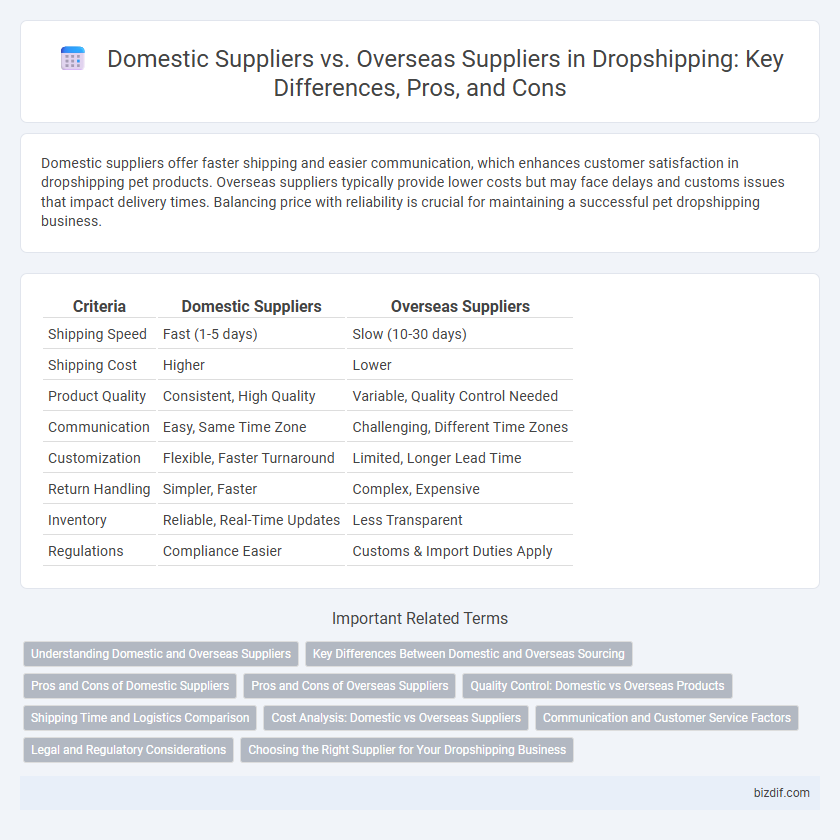Domestic suppliers offer faster shipping and easier communication, which enhances customer satisfaction in dropshipping pet products. Overseas suppliers typically provide lower costs but may face delays and customs issues that impact delivery times. Balancing price with reliability is crucial for maintaining a successful pet dropshipping business.
Table of Comparison
| Criteria | Domestic Suppliers | Overseas Suppliers |
|---|---|---|
| Shipping Speed | Fast (1-5 days) | Slow (10-30 days) |
| Shipping Cost | Higher | Lower |
| Product Quality | Consistent, High Quality | Variable, Quality Control Needed |
| Communication | Easy, Same Time Zone | Challenging, Different Time Zones |
| Customization | Flexible, Faster Turnaround | Limited, Longer Lead Time |
| Return Handling | Simpler, Faster | Complex, Expensive |
| Inventory | Reliable, Real-Time Updates | Less Transparent |
| Regulations | Compliance Easier | Customs & Import Duties Apply |
Understanding Domestic and Overseas Suppliers
Domestic suppliers offer faster shipping times and easier communication, enhancing customer satisfaction and reducing delivery delays in dropshipping. Overseas suppliers often provide lower product costs and a wider range of inventory but may involve longer shipping durations and potential customs issues. Evaluating factors such as lead time, product quality, and import regulations is essential for optimizing dropshipping operations between domestic and overseas suppliers.
Key Differences Between Domestic and Overseas Sourcing
Domestic suppliers offer faster shipping times, enhanced communication, and easier quality control, making them ideal for businesses prioritizing customer satisfaction and rapid order fulfillment. Overseas suppliers often provide lower production costs and a wider variety of products but involve longer shipping times, potential language barriers, and complex customs regulations. Balancing cost efficiency with logistical challenges is crucial when choosing between domestic and overseas sourcing in dropshipping.
Pros and Cons of Domestic Suppliers
Domestic suppliers offer faster shipping times and better communication, improving customer satisfaction and reducing delivery delays in dropshipping operations. They often provide higher product quality and easier returns, minimizing logistical complications and enhancing trust with buyers. However, domestic suppliers usually entail higher costs and limited product variety compared to overseas suppliers, potentially impacting profit margins and inventory diversity.
Pros and Cons of Overseas Suppliers
Overseas suppliers often offer lower product costs and a wider variety of goods, making them attractive for dropshipping businesses seeking competitive pricing and diverse inventory. However, longer shipping times and potential customs delays can impact customer satisfaction and increase operational complexity. Communication barriers and quality control challenges may also pose risks to consistency and timely order fulfillment.
Quality Control: Domestic vs Overseas Products
Domestic suppliers typically offer tighter quality control due to closer proximity, allowing for easier product inspections and faster resolution of defects. Overseas suppliers often face challenges such as longer shipping times and communication barriers, which can compromise the consistency and reliability of product quality. Investing in thorough quality checks and sample orders is critical when working with overseas suppliers to mitigate risks associated with inconsistent standards.
Shipping Time and Logistics Comparison
Domestic suppliers typically offer faster shipping times, often within 3-5 business days, enhancing customer satisfaction and reducing delivery-related inquiries. Overseas suppliers, while usually offering lower product costs, can extend shipping times to 2-6 weeks due to international logistics, customs clearance, and longer transit distances. Efficient inventory management and reliable tracking systems are crucial for both, but domestic suppliers generally provide more predictable delivery schedules and simplified returns.
Cost Analysis: Domestic vs Overseas Suppliers
Domestic suppliers typically offer faster shipping times and lower shipping costs, which can reduce overall expenses despite higher product prices. Overseas suppliers often provide significantly lower product costs but incur higher shipping fees, longer delivery times, and potential customs duties, impacting total cost efficiency. Careful analysis of product price, shipping fees, import taxes, and delivery timelines is essential to optimize dropshipping profitability.
Communication and Customer Service Factors
Domestic suppliers offer faster and more reliable communication, often providing real-time support which enhances customer service efficiency. Time zone alignment with domestic suppliers minimizes delays in order processing and issue resolution, improving overall responsiveness. Overseas suppliers may present language barriers and slower response times, complicating customer service interactions and potentially impacting customer satisfaction.
Legal and Regulatory Considerations
Domestic suppliers in dropshipping often offer easier compliance with local laws, including consumer protection, import regulations, and tax requirements, minimizing legal risks for sellers. Overseas suppliers may involve complex customs procedures, varying intellectual property laws, and potential exposure to stricter international trade regulations or tariffs. Ensuring thorough due diligence on regulatory standards and supplier certifications is critical to avoid legal disputes and maintain smooth cross-border operations.
Choosing the Right Supplier for Your Dropshipping Business
Choosing the right supplier for your dropshipping business significantly impacts delivery speed, product quality, and customer satisfaction. Domestic suppliers offer faster shipping times and easier communication, reducing potential delays and returns, while overseas suppliers provide access to a broader range of products at lower costs but often involve longer shipping times and increased risk of customs complications. Evaluating factors such as shipping reliability, product quality, pricing, and customer support helps identify the supplier that aligns best with your business model and target market expectations.
Domestic Suppliers vs Overseas Suppliers Infographic

 bizdif.com
bizdif.com